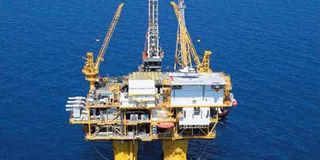Reasons behind decline in gas exploration revealed

A rig at an exploration site in deep sea. Natural gas exploration in Tanzania has slowed in recent years. PHOTO | FILE
What you need to know:
- The government has confirmed that the number of gas exploration licences for eight companies has dropped from 26 to 11 within a decade.
Dar es Salaam. Tanzania’s natural gas exploration activities are dropping amid reports that some investors are contemplating to sell their stakes and focus on other countries.
The government has confirmed that the number of gas exploration licences for eight companies has dropped from 26 to 11 within a decade.
Recently, Parliament’s Budget Committee asked the government to conduct a thorough analysis on the reasons behind the fall.
US Exxon Mobil is seeking to sell its stake in gas field off Tanzania to develop a bigger project in Mozambique.
Exxon Mobil holds a 35 per cent stake in Tanzania’s deepwater Block 2 field that was discovered early this decade. It holds an estimated 23 trillion cubic feet of gas, according to the website of Norway’s Equinor, which operates the block and holds a 65 per cent stake.
According to the Reuters, the prospect had faced repeated delays in recent years due mainly to a lack of infrastructure and regulation for the country’s nascent oil and gas sector, complicating any sale. The value of the asset was unclear due to early stage of development and uncertain future, the news agency reported. The acting director general of the Petroleum Upstream Regulatory Authority (Pura), Mr Charles Sangweni, told BusinessWeek: “We are very smart with contracts to make sure that we do not repeat the previous mistakes. So companies are annoyed with this and that’s why some of them pull out. As you know this is business and they want to maximise profits.”
He stated that no company had pulled out just for an unfavourable environment. “It just depends on exploration contracts.”
He clarified that the Petroleum Act gives companies 11 years of exploration of which is divided into three consecutive periods of 4:4:3.
“For the first four years, the company will explore the area. If it finds gas, it confines itself to a particular block and then moves to another. If it loses it also loses a half of the bloc and it continues to another for the second four years period.
“If it loses at the second block, it gets another three years. If it loses again it also loses the whole block. But if it gets at the first block and misses at the second block it can apply for the development license. That’s why most companies leave. Even if we would register 100 companies we don’t expect them all to win,” he said.
He also mentions the falling of world market prices, saying the trend discourages some companies to continue with the business fearing to risk their capital.
Natural Resource Governance Institute director Silas Olang concurs with Mr Sangweni on the drop of oil prices globally as an international factor.
“In 2015 when investors came, gas prices in the world market were $12-14 per unit. The prices have dropped to $8 per unit. So if you combine the processing costs it doesn’t pay,” he said. However he explained that the oil price had started recovering in recent months and investors could be convinced to remain in Tanzania.
Speaking on internal factors, Mr Olang said the amendment of the Mining Act done in 2017 sent shock waves through the mining community.
“Costs have increased in some areas of investment. There is also the issue of banking in which they are required to bank their fund locally. How safe is our banking system? How capable is it?
“Also there’s the issue of arbitration of which they are now required to log their cases to the local courts in case of misunderstandings. How impartial are the local courts? They seem to be confident with international courts.”
However, Statoil Tanzania which operates in Block 2 with partners ExxonMobil and TPDC as the license holder told BusinessWeek that they were proceeding with the operations as usual.
The Statoil spokesperson for International Upstream, Erik Haaland, said they had completed a successful drilling campaign in Block 2 early in 2015 and finalised a commitment well in January 2018. “The drilling campaign resulted in 15 wells and nine discoveries. Over $2 billion has been invested to date in Tanzania,” he stated in an emailed communication. He said the current phase of activities requires an establishment of the commercial and fiscal framework (Host Government Agreement) that will enable the development of the resources discovered in Block 2.
“We believe through collaboration, cooperation and support from the government this endeavour will become possible for the benefit of all parties involved,” he said.
Apart from Exxon, other companies in planned LNG exploration are Tanzania Petroleum Development Corporation, BG/ Shell, Statoil, Pavilion and Ophir.
Tanzania has discovered more than 57 trillion cubic feet of natural gas and currently the government is ongoing with discussions for the construction of the planned liquefied natural gas plant in Lindi.
The construction of the $30 billion project is expected in 2022, Energy minister Medard Kalemani told the National Assembly recently.




